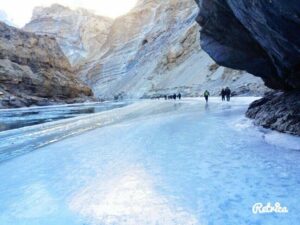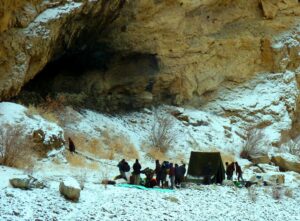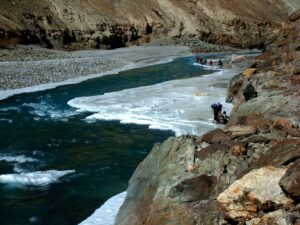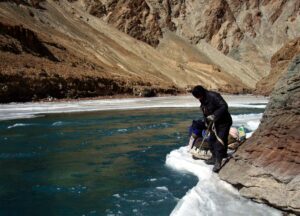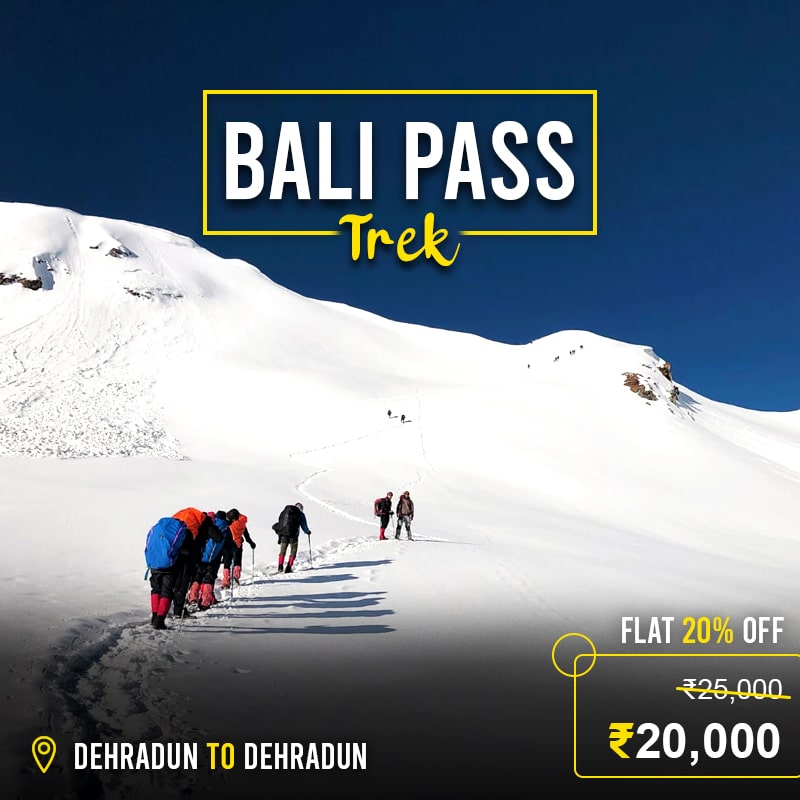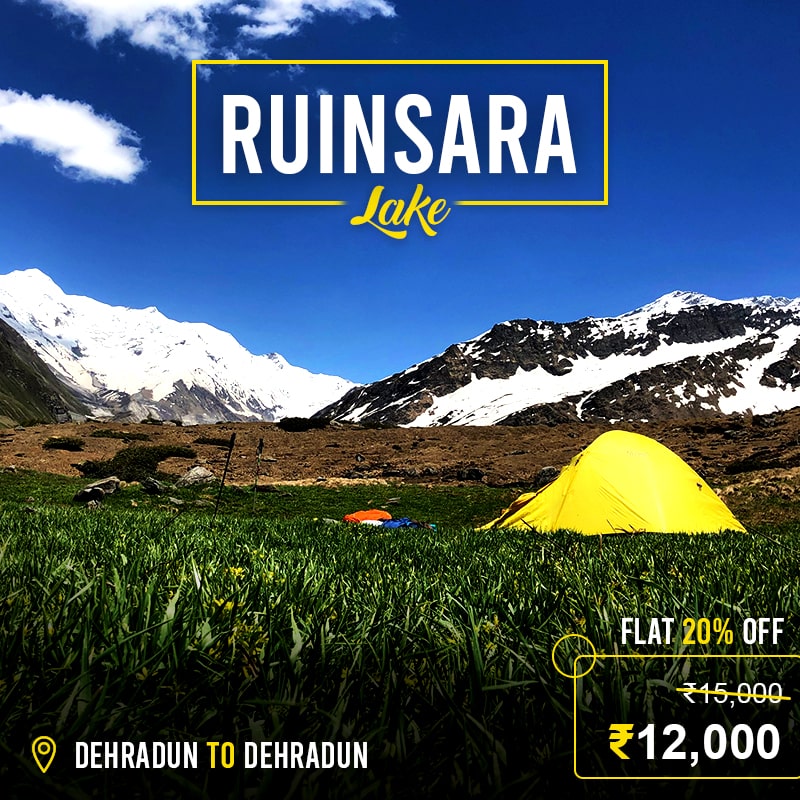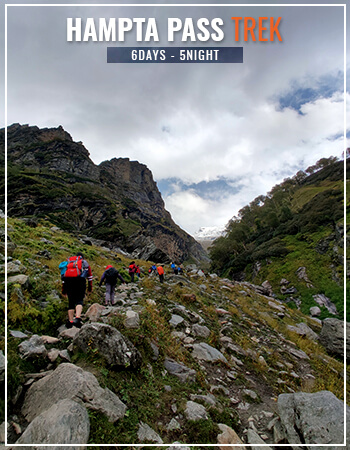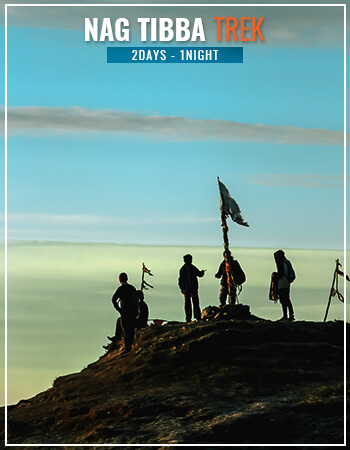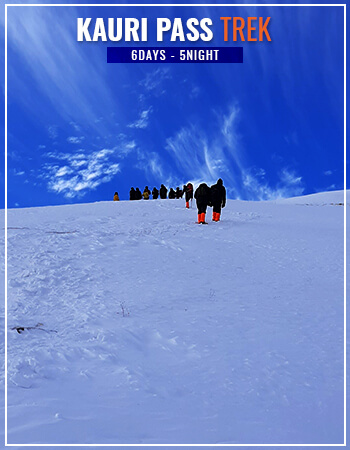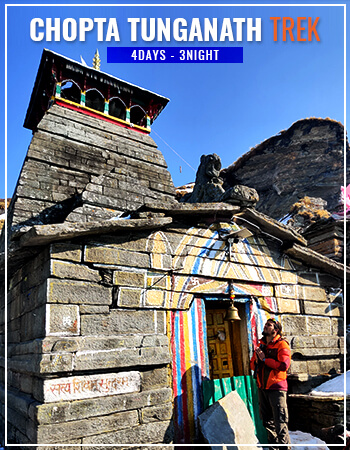CHADAR TREK
9 Days - 8 Night
9 Days - 8 Night
11,400 ft.
Moderate
LEH
ABOUT
CHADAR TREK
The Chadar Trek in Ladakh is unlike any other Himalayan trek. Walking on a frozen, glassy river with dramatic mountains on both sides is a once-in-a-lifetime experience. Chadar Trek, at just 11150 feet above sea level, sounds more like an expedition to the North Pole, where temperatures drop to -30 degrees at night, rations are carried on sledges, you seek shelter in caves, and life thrives on survival instincts, making it a must-do journey. The Chadar trek helps you to get up close and personal with the Zankari community through the locals you encounter along the way and their hospitality.
SHORT ITINERARY
-
DAY 1
Arrival in Leh
-
DAY 2
Acclimatization and Rest Day
-
DAY 3
Medical Checkup
-
DAY 4
From Leh towards Shingra Koma via Bakula
-
DAY 5
From Shingra Koma towards Tibb
-
DAY 6
From Tibb towards Nerak
-
DAY 7
From Nerak towards Tibb
-
DAY 8
From Tibb to Bakula and Leh Drive
-
DAY 9
Leh Departure
DETAILed ITINERARY
Day 1: Arrival in Leh
The flight to Ladakh is breathtakingly beautiful. By 12 p.m., you should be in Leh. You get a bird’s eye view of the whole region, and the layers of snow-covered mountains make you understand why driving to Ladakh in the winter is difficult. The temperature will decrease as soon as you arrive at Leh airport, which is also one of the world’s highest airports. Gather your belongings and check into your designated lodgings. Today is a crucial day for acclimatization, so try to spend as much time outside as possible, but don’t overdo it. In the winter, Leh is quiet, with few shops and eateries open for company.
Day 2: Acclimatization and Rest Day
The next day is set aside for acclimatization. During the day, your leader will take you on a light acclimatization stroll. According to current Leh local government rules, you must be medically checked at SNM Hospital in Leh, and the checkup will take place today.
Day 3: Medical Checkup
You must have a mandatory medical checkup at the Tourist Information Center today, as well as an ALTOA NOC and a Wildlife Department permit. Staying in a hotel in Leh for the night.
Day 4: From Leh towards Shingra Koma via Bakula
Today is the first day of our frozen river journey in Zanskar. You travel down the magnificent Indus river, stopping to see the Indus and Zanskar river confluence at Nimmu. We’ll travel a cumulative distance of 70 kilometers by route, and you’ll see a few jaw-dropping moments as the vehicle navigates the tight hairpin bends. The journey to Bakula should take about 3 hours, and as you get closer, the motivating sight of the frozen Zanskar will pique your interest in the trek. Your leaders will send you instructions on how to walk on Chadar shortly. For the remainder of the day, you’ll have the campsite to yourself to discover and photograph. Shingra Koma is a great place to spend the night.
Day 5: From Shingra Koma towards Tibb
The most difficult part would be slipping out of your cozy sleeping bags and walking outside your tent in the freezing cold. The Zanskari are noted for their hospitality, and your staff will rise early to make sure you have a hot cup of tea and a warm meal before you depart. Today will be a long walking day; you’ll travel a total of 14 kilometers on Chadar and arrive at your next campsite in around 6 to 7 hours. Fill your thermos with warm water before you leave; due to the high temperatures in this region, all liquids begin to freeze, so a thermos is essential. Since the massive rocky mountains on both sides of the Zanskar river appear to obscure the light, you can only see it about 9-10 a.m., and then only in spots. When you stroll through this vast valley with nothing but pure crisp air and massive rocks on all sides, take in the sights. The Zanskar river, which flows through the center, is a vivid and deep blue color, and you can often see water running underneath you beneath the dense ice sheet. Along the way, you’ll pass by a few frozen waterfalls. Midway through, your team will prepare a warm lunch for you, so fill your bellies and relax with a hot cup of tea. You’ll be at Tibb by 3 p.m., and the final 200 meters are breathtaking. Tibb is a great place to spend the night.
Day 6: From Tibb towards Nerak
After reaching your campsite, you will have the opportunity to see the “mother of all waterfalls,” the “Nerak waterfalls.” This is the most important day on the Chadar trek because you will have the opportunity to see the “mother of all waterfalls,” the “Nerak waterfalls.” You’ll be up early and it’s going to be another busy day. If you arrive at Nerak campsite before 3 p.m., you’ll have plenty of time to explore the Nerak waterfall. The sun will be shunned once more in the Zanskar valley, so keep going to stay wet. In the center of the frozen river, numerous blocks of ice are melted, creating geometrical forms of various shapes and sizes that are interesting to see. Take advantage of the remaining hours of the day. Tibb is a great place to spend the night.
Day 7: From Nerak towards Tibb
You’ll retrace your steps back to the Tibb campsite today. And if you think you’ll see the same frozen ice cap again, you’re mistaken. The frozen Zanskar river responds to even the smallest changes in temperature by shifting its shape. On the ride back, you won’t be able to remember the sights because everything seems to be too new. Depending on the atmosphere, you can walk on a glass-like surface or patches and patches of slush. Local porters will be wearing traditional woolen robes called ‘Gonchas,’ with colorful beads around their necks and traditional hats, along the way. Spend the night.
Day 8: From Tibb to Bakula and Leh Drive
We’ll hike to Bakula today, the last day of the Chadar trek. Bakula can take you about 7 to 8 hours to enter. We’ll travel back to Leh from Bakula, bringing the Chadar – the frozen river trek to a close. Return to your hotels, do some last-minute shopping before the market closes, and get ready to board your flight on time. Staying in a hotel in Leh is a good idea.
Day 9: Leh Departure
Today, we fly back to our respective homes. You will enjoy the memories of one of India’s finest treks for the rest of your life.
subscribe Now
DETAILed ITINERARY
Day 1: Arrival in Leh
The flight to Ladakh is breathtakingly beautiful. By 12 p.m., you should be in Leh. You get a bird's eye view of the whole Read More
Day 2: Acclimatization and Rest Day
The next day is set aside for acclimatisation. During the day, your leader will take you on a light acclimatisation stroll. According to current Leh local government rules, you must be medically checked at SNM Hospital in Leh, and the checkup will take place today.
Day 3: Medical Checkup
You must have a mandatory medical checkup at the Tourist Information Center today, as well as an ALTOA NOC and a Wildlife Department permit. Staying in a hotel in Leh for the night.
Day 4: From Leh towards Shingra Koma via Bakula
Today is the first day of our frozen river journey in Zanskar. You travel down the magnificent Indus river, stopping to see the Indus and Zanskar river confluence at Nimmu. We'll travel a cumulative distance Read More
Day 5: From Shingra Koma towards Tibb
The most difficult part would be slipping out of your cosy sleeping bags and walking outside your tent in the freezing cold. The Zanskari are noted for their hospitality, and your staff will rise early to make sure you have a hot cup of tea and a warm meal before you depart. Read More
Day 6: From Tibb towards Nerak
After reaching your campsite, you will have the opportunity to see the "mother of all waterfalls," the "Nerak waterfalls." Read More
Day 7: From Nerak towards Tibb
You'll retrace your steps back to the Tibb campsite today. And if you think you'll see the same frozen ice cap again, you're mistaken. The frozen Zanskar river responds to even the smallest changes in temperature by shifting its shape. On the ride back, you won't be able to remember the sights because everything seems to be too new. Depending on the atmosphere, you can walk on a glass-like surface or patches and patches of slush. Local porters will be wearing traditional woollen robes called ‘Gonchas,' with colourful beads around their necks and traditional hats, along the way. Spend the night.
Day 8: From Tibb to Bakula and Leh Drive
We'll hike to Bakula today, the last day of the Chadar trek. Bakula can take you about 7 to 8 hours to enter. We'll travel back to Leh from Bakula, bringing the Chadar - the frozen river trek to a close. Return to your hotels, do some last-minute shopping before the market closes, and get ready to board your flight on time. Staying in a hotel in Leh is a good idea.
Day 9: Leh Departure
Today, we fly back to our respective homes. You will enjoy the memories of one of India's finest treks for the rest of your life.
subscribe Now
Get Quote
DEPATURE DATE
Call- +91-8979108941 | +91-9458118063
Call- +91-8979108941 | +91-9458118063
Call- +91-8979108941 | +91-9458118063
Call- +91-8979108941 | +91-9458118063
Call- +91-8979108941 | +91-9458118063
COST INCLUSION
-
Pick and Drop Service from mentioned location
-
Fees for the guide and the chef
-
Camping facilities' rent
-
Entrance fees to the forest
-
To transport camping gear, a porter and mule are required. Please keep in mind that personal baggage can be borne by mules and/or porters for a fee
-
From the first day's dinner until the last day's brunch, both of the meals are vegetarian
-
Throughout the walk, you'll be staying in a tent or if possible, then in a guest house
COST EXCLUSION
-
No pickup and drop point from/for your hometown
-
Personal costs include things like tips, personal medications, and conference calls, etc
-
Apart from what is mentioned above, some transportation assistance during the trek
-
Porters/mules can carry personal luggage weighing up to 12 kg per bag per person for Rs 350 per day per bag
Frequently asked question
- Footwear: The trekking boots which must be waterproof and snow proof, normal boots, floaters, and woolen socks.
- Backpack: (50 ltr), Daypack (20-30 ltr), Duffel bag.
- Clothes: Jacket and trousers that are both waterproof and breathable. Jacket (synthetic or down feather fleece), synthetic insulated trousers, poncho, sweatshirt, inner thermal (upper & lower), fleece, t-shirts, cotton trekking pants, shorts
- Season wise Clothes:
- Hand and head protection includes liner gloves, bandannas, sun hats, woollen caps, and face masks, among other things.
- Accessories: Sunglasses/goggles, anti-glare lenses, water bottle, hydra bag, and headlamp with spare bulb and extra batteries are all recommended.
- Trekking Gears: Toolkit for an emergency. Sunscreen, a toiletry pack, water purification pills, Ziploc packs, ear plugs, first-aid kit, and the necessary medications are all recommended.
- Camping Equipment: Sleeping bags of lining (extreme -5 to +5 Celsius if you have one), trekking sticks, and so on.
- Warm top/light micro fleece pullover/full sleeve T shirt – 2/3
- Water resistant/repellent trekking pants with an inner lining for added warmth- 2 High-quality windproof/water-resistant outer shell (jacket) with a proper hood
- Thick Fleece / Full-sleeve Woollen Jumper, Down Jacket with at least 600 fill capacity Innerwear with a thermal component (upper and lower)
- Woolen hat, inner fleece gloves, and outer water-resistant gloves
- 4–5 pairs of thick woollen socks and standard socks, scarf/muffler (optional)
- Waterproof Trekking/Hiking shoes with a thick heel and high ankles that are comfortable to wear. Sneakers/sport shoes are ideal for camp.
- Poncho or raincoat. A small, light-weight towel
- A hydration pack and an insulated water bottle (optional)
- Sunglasses with UV cover and the potential to cut light, as well as a cap or floppy hat to shield the strong sun off your skin (important when traversing through snow)
- Trekking pole or sturdy walking stick Lip Balm, Sunscreen Lotion
- Flashlight / torch (with extra batteries) Medications, if any special prescription is needed Toiletries for personal use
- Carry a rain cover over your luggage • Day pack/small bag that you can carry on your back all day to keep your essentials in
- Keep a few poly bags or plastic containers in your bag to place your things in if you need to in case of heavy weather.
Personal Medical Kit (MANDATORY FOR ALL)
- 10 Diamox tablets (to prevent AMS)
- Nifedipine – 5 pills Dexamethasone – one strip
- 6 tablets of Crocin (fever)
- 4 tablets of avomine (motion sickness) 4 capsules of Avil 25mg (allergies)
- 4 tablets of Combiflam (Pain killer)
- 6 tablets each of Norflox TZ and Lomofen (diarrhea) 10 tablets of Digene (acidity)
- 10 Omez/Rantadine capsules (antacids) 3 to 5 metres of crepe bandage
- 1 tiny roll of gauze 10 strips of bandage 1 small roll of cotton 10 packets of ORS
- Moov spray Betadine or other antiseptic cream (aches, & sprains)
- If you're vulnerable to knee injuries, you should wear a knee cap. Powder with antifungal properties
- Cancellation: If a trek is cancelled at the last minute due to a natural disaster or unforeseeable circumstances (such as floods, earthquakes, landslides, attack, or bandh), Discoveryhike will have a trek voucher for the full number. The voucher can be used for the same or a different trek over the next year.
- In case you wish to cancel the trek, then please be aware of these things:
- Cancellations made within 30 days of the trek's launch date will include a complete refund.
- If you cancel within 30 and 20 days before the hike, you will get a 50% refund.
- There will be no refund if you cancel less than 20 days before the trek begins.
- Please keep in mind that if you get a refund, there will be a reduction of 4% (Cancellation charges) from the overall amount you pay. In addition, if you purchased trek insurance, you would not get a refund.
- Discoveryhike assumes no responsibility for any malfunction or injury to your clothes, supplies, or other belongings while on the trek. The trek fee covers all expenses associated with the trek from start to finish.

